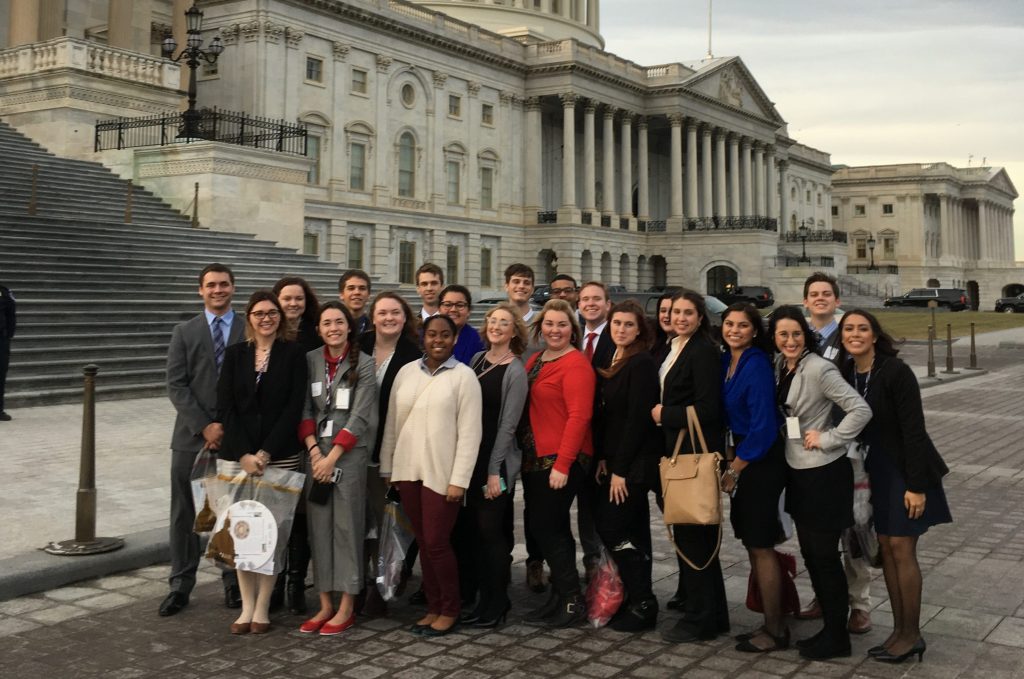Twenty-three students attending the presidential inauguration during the Civil Discourse in Politics short course say they are just as divided among their views as the rest of the nation.
Braden Crow, a junior biblical text and communication double major from Fort Worth, signed up for the short course because he is interested in politics in addition to others’ opinions on certain policies. Crow also said he registered after the election results, so he knew what he signed up for.
“This is a really important inauguration just because of where the United States is on the world stage right now,” Crow said over text message from Washington. “While we try to bring peace to a war-torn Middle East, and immigration is becoming a hotter topic by the day. Domestically, we are still facing challenges of people still feeling like they are not being heard. The point is this: our country voted for the candidate who marketed ‘change’ for the people and the people got the candidate that they voted for.”
During the trip, Crow said the group got to see the government come to life. They visited the U.S. Senate to witness it in action and got to see people such as Sens. Ted Cruz, John McCain and Marco Rubio. Although he said this was exciting, Crow said he is most looking forward to the inauguration itself, despite how chaotic Washington, D.C. will be.
“There could, in all reality, be well over 1 million people there on Friday, so while I am looking forward to it, I am naturally a bit intimidated,” Crow said.
Crow also offered his reflection on Obama’s presidency, saying that although he wouldn’t consider himself a fan of the 44th president, he will miss how ethically and morally convicted Obama was. His legacy, which is known by the change he sought, should not be taken for granted.
“I am excited for Trump because he brings a completely new skill set to the table in Washington. He is extremely charismatic, he’s an intelligent businessman, and he cannot be bought.”
Other students who attended the trip, such as junior child and family services major Caitlin Walker, expressed their concern for the nation because of Trump’s negative rhetoric.
“I don’t want the young ones in my family looking up to that rhetoric or thinking you can speak to persons of different sex, race, religion, or other nations in a way that is derogatory,” Walker said over text message. “I really hope that the presidency changes him and that he knows he cannot change the presidency.”
The inauguration is expected to be among the most controversial in United States history, according to The New York Times, with an increased number of protests around the world.
Nicholas Fandos, a reporter for The New York Times, said U.S. officials expect about 700,000 to 900,000 people to attend the inauguration. Despite the organization of over 99 protests unifying 234,000 protesters in just the United States, security is roughly the same as the 2009 inauguration.
Within the short course, Dr. Suzie Macaluso, assistant professor and director of the sociology program, said through email that The Washington Center has been giving instructions for students to avoid protest areas and avoid engaging with protestors at the event.
Despite the divisions and tensions around the nation as a whole, Walker also provided words of advice for people regardless of political knowledge.
“Your voice in politics matters but you have to make sure you allow yourself to be heard; once you speak, no one can take that from you,” Walker said. “Join the fight to sustain democracy and to stand up for not only our rights as people but the human rights initiative we can give to other nations globally. Listen first, be willing to learn something new each day, speak up, aim for love to those different and alike to you, and always, always be kind.”

